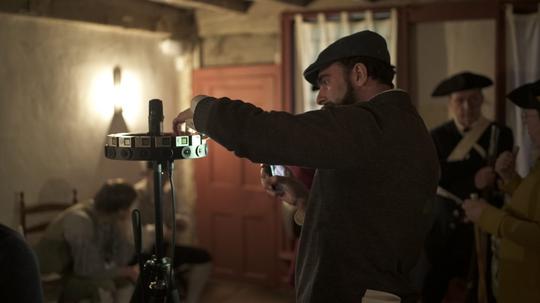
RIVR is trying to do something big. In their own words? That’s “nurturing the development of a virtual reality ecosystem in Rhode Island.”
They understand the initial skepticism of their goal, or at least, Adam Blumenthal did when we chatted on the phone. He’s a VR artist-in-residence at Brown University, executive producer at Curious Sense, RIVR team member, and has long been interested in VR storytelling.
I ask him how Rhode Island makes sense for a VR hub. I mean, when I think of this kind of technology, Los Angeles or New York City or the Research Triangle comes to mind long before Rhode Island does.
To understand why Rhode Island is a successful place for VR, however, I have to understand the actual technology, and Blumenthal is kind enough to put VR and AR (augmented reality) in layman’s terms.
“Virtual reality and augmented reality are sort of siblings,” he says. “Users put on special eyewear, which either replaces or augments their view of the real world with digital content.”
While augmented reality adds a new layer to the environment around participants, in a way similar to, say, "Pokemon Go," VR fully transports users. In the latter case, “they’re not seeing the world that they’re in,” he adds. That's where RIVR's primary focus is.
Blumenthal further dubs VR “horizontal tech" - meaning, it’s akin to a Swiss Army Knife in that it has uses across the board. There's VR applications for education, entertainment, marketing … the list goes on.
It’s been around since the 1980s, although interest in the field had many peaks and valleys. For Blumenthal, he first “met” VR in 1990, during his film school stint. “At that time, VR was a tech that NASA and the military were using; those were the places where it started,” he says.
Then, the industry went into a sustained mostly hibernation, until Facebook’s highly publicized acquisition of the garage-born, teenager-helmed VR company, Oculus, in 2014. “It really integrated a new wave of VR,” Blumenthal says. “From a business standpoint, there’s now an industry that’s seeing a lot of investment.”
That was something Blumenthal experienced first-hand when he moved back to Rhode Island in 2016. There was already “a lot happening in VR in Rhode Island from all over the state,” he tells me.
But again – how? It's a multi-faceted answer, he says.
Rhode Island is basically a perfect storm of resources within a small proximity. The world’s largest toy company, Hasbro, is headquartered within the state, and VR toys and games are among some of the most popular utilizations of the technology.
Then, of course, there’s the state’s many universities: Brown, RISD, URI, the New England Institute of Technology — the latter of which has a video game major, Blumenthal adds. Great minds are doing great things, pushing the boundaries of what we do know about VR and exploring what we don't.
There’s also the fact that Rhode Island is the smallest state in the Union, and it's in part what makes the VR scene so electric: the ease with which different representatives can meet and share ideas. “[We can get] around the table pretty easily,” he says.
Government support for the industry doesn’t hurt, either. “Rhode Island is kind of like a small town at the state level,” Blumenthal continues. “And then, the other part of it is the government is really interested in fostering innovation and transforming our older industries into newer things.”
All these elements are also mired in a state-wide tradition of innovation. From the navy’s long-term use of VR to train recruits, to the invention of computer graphics at Brown in the 1960s, the Ocean State has never been one to shy away from new ideas, he adds. Indeed, Rhode Island was once dubbed “the lively experiment,” and the spirit that inspired the name has never died, local entrepreneur and RIVR team member, Lorne Adrain, says. It’s just a part of that “secret sauce” that makes Rhode Island so ripe for this kind of work.
Which brings us to the formation of RIVR in 2016, formed and led by volunteers Adrain and Blumenthal, as well as Ted Bogosian, Emmy-winning producer and filmmaker; Siu-Li Khoe, MIT alum, and Tom Sgouros, Brown visiting scientist.
They want to spin these resources into gold. “Basically, the idea is to bring everyone together: Hasbro, to the Navy in Newport, and all the universities and many startups," Blumenthal says. “Most people are not aware of what people are doing, [and RIVR helps] collect the practitioners for knowledge sharing, sort of wrap our heads around the market, the global industry and attract investment here.”
RIVR hosts events and meet-ups around the state to help foster these relationships.
The group also wants to give back by creating its own resources. To do that, RIVR has applied for an industry cluster grant via the Rhode Island Commerce Department. Should their application be successful, it would give the all-volunteer group access to full-time workers and potentially begin the process of creating more VR innovation and education spaces, a goal of Blumenthal's.
It’s the educational side of VR, the side that allows users to see worlds beyond their reach, that excites Blumenthal the most. He's channeled this passion into one of his recent projects, making the local Gaspee affair into an illustrious historical VR experience.
The project boasts a Jump rig (cutting-edge equipment loaned by Google), attention from the Associated Press, and a warm reception. "I chose the story of the Gaspee because I love history, and it’s a good Rhode Island story,” Blumenthal tells me.
It's also an incredible opportunity for students. “The experience that we're giving them is not just being a fly on the wall in terms of events, but actually being a participant.” As someone who was able to stand on the deck of the Gaspee from the comfort of Blumenthal's lab, I can attest that it's certainly a powerful trip.
But his ongoing success with the Gaspee project isn't the only testament to VR's power. In fact, people outside Rhode Island are acknowledging the importance of this emerging tech.
Blumenthal cites what he calls “significant analyses” done on the VR and AR space, conducted by Goldman Sachs and Bank of America Merril Lynch. “The Goldman Sachs report projects that VR/AR will be the next revolutionary platform,” he tells me. Indeed, the report reads: “As the technology advances, price points decline, and an entire new marketplace of applications (both business and consumer) hit the market, we believe VR/AR has the potential to spawn a multibillion-dollar industry, and possibly be as game changing as the advent of the PC.”
It continues: “We see qualities in VR/AR technology that can take this from niche use cases to a device as ubiquitous as the smartphone.” GS predicts that in 10 years, the industry could have an annual revenue of $180 billion, while the Bank of America Merrill Lynch study calls VR/AR “the fourth computing revolution” with a $150 billion annual revenue in five year’s time.
What does that mean for Rhode Island? Hard to say for sure. “As new and existing technologies evolve and as their costs are driven down, imagination and entrepreneurship will drive innovation far beyond what we imagine today,” Adrain says. “There is big money ahead for this category and Rhode Island is well positioned to grab a chunk of it. Innovation in a free society is a certainty, but freedom also makes the adventure of innovation hard to predict.”
Regardless, RIVR is already making a name for itself in this emerging field, where it will keep fostering the industry, come what may.








